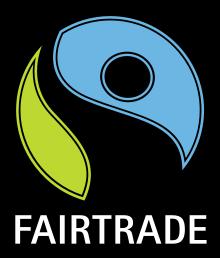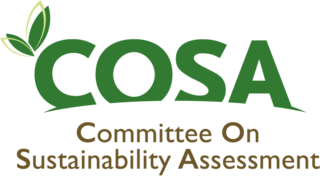Related Research Articles

Fair trade is a term for an arrangement designed to help producers in developing countries achieve sustainable and equitable trade relationships. The fair trade movement combines the payment of higher prices to exporters with improved social and environmental standards. The movement focuses in particular on commodities, or products that are typically exported from developing countries to developed countries but is also used in domestic markets, most notably for handicrafts, coffee, cocoa, wine, sugar, fruit, flowers and gold.

The cocoa bean or simply cocoa, also called cacao, is the dried and fully fermented seed of Theobroma cacao, the cacao tree, from which cocoa solids and cocoa butter can be extracted. Cocoa trees are native to the Amazon rainforest. They are the basis of chocolate and Mesoamerican foods including tejate, an indigenous Mexican drink.

Cargill, Incorporated, is an American global food corporation based in Minnetonka, Minnesota, and incorporated in Wilmington, Delaware. Founded in 1865, it is the largest privately held company in the United States in terms of revenue.

Illycaffè S.p.A. is an Italian coffee company specializing in espresso, headquartered in Trieste. Illy markets its coffee globally in silver and red pressurized, oxygen-free cans; operates a network of cafes on shopping streets, in museums, and in airports; and, since 2009, has marketed a line of coffee-flavoured energy drinks as illy issimo.

The Fairtrade Foundation is a charity based in the United Kingdom that aims to help disadvantaged producers in developing countries by tackling injustice in conventional trade, in particular by promoting and licensing the Fairtrade Mark, a guarantee that products retailed in the UK have been produced in accordance with internationally agreed Fairtrade standards. The foundation is the British member of FLO International, which unites FLO-CERT, 25 National Fairtrade Organisations and 3 Producer Networks across Europe, Asia, Latin America, North America, Africa, Australia and New Zealand.

The Rainforest Alliance is an international non-governmental organization (NGO) with staff in more than 20 countries and operations in more than 70 countries. It was founded in 1987 by Daniel Katz, an American environmental activist, who serves as the chair of the board of directors. The NGO states that its mission is "to create a more sustainable world by using social and market forces to protect nature and improve the lives of farmers and forest communities." Its work includes the provision of an environmental certification for sustainability in agriculture. In parallel to its certification program, the Rainforest Alliance develops and implements long-term conservation and community development programs in a number of critically important tropical landscapes where commodity production threatens ecosystem health and the well-being of rural communities.

The Fair Trade Association of Australia and New Zealand is a member-based organization that supports two systems of fair trade. The first is the Australia and New Zealand member of FLO International, which unites Fairtrade producer and labeling initiatives across Europe, Asia, Latin America, North America, Africa, Australia and New Zealand. The second, is the World Fair Trade Organization (WFTO), of over 450 worldwide members, to which the Fair Trade Association is one. Fairtrade refers to FLO certified commodity and associated products. Fair trade encompasses the wider Fair Trade movement, including the Fairtrade commodities and other artisan craft products.

UTZ, formerly called UTZ Certified, is a program and a label for sustainable farming. The organization was founded as a non-profit in the Netherlands in 2002. The UTZ label is featured on more than 10,000 product packages in over 116 countries. In 2014, UTZ was reported to be the largest program for sustainable farming of coffee and cocoa in the world. The UTZ program addresses agricultural practices, social and living conditions, farm management, and the environment. In January 2018, UTZ officially merged with the Rainforest Alliance in response to the increasing challenges of deforestation, climate change, systemic poverty, and social inequity.
Olam International is an agri-business company, operating in 60 countries and supplying food and industrial raw materials to over 20,900 customers worldwide, placing them among the world's largest suppliers of cocoa beans, coffee, cotton and rice. Its value chain includes farming, origination, processing and distribution operations, child labor, and allegedly even child slavery.

Agriculture in Indonesia is one of the key sectors within the Indonesian economy. In the last 50 years, the sector's share in national gross domestic product has decreased considerably, due to the rise of industrialisation and service sector. Nevertheless, for the majority of Indonesian households, farming and plantation remains as a vital income generator. In 2013, the agricultural sector contributed 14.43% to national GDP, a slight decline from 2003's contribution which was 15.19%. In 2012, the agricultural sector provides jobs to approximately 49 million Indonesians, representing 41% of the country's total labor force.
Sucden is a French-based commodity broker of soft commodities and other financial products headquartered in Paris. The firm started as a sugar broker and is now amongst the world leaders with a market share of around 15% in volume, or 9.5 million tonnes. It has offices in a number of countries around the world, including London and Hong Kong.

Fair trade coffee is coffee that is certified as having been produced to fair trade standards by fair trade organizations, which create trading partnerships that are based on dialogue, transparency and respect, with the goal of achieving greater equity in international trade. These partnerships contribute to sustainable development by offering better trading conditions to coffee bean farmers. Fair trade organizations support producers and sustainable environmental farming practices and prohibit child labor or forced labor.
This article addresses various criticisms of Cargill Inc, a privately held "agribusiness" multinational giant" with operations in 70 countries and its headquarters in Minneapolis, Minnesota, in the United States. Cargill Inc, which has been owned by the Cargill family for 154 years, is the largest privately owned corporation in the United States, with an annual revenue of $113.5 billion in 2019.

A fair trade certification is a product certification within the market-based movement of fair trade. The most widely used fair trade certification is FLO International's, the International Fairtrade Certification Mark, used in Europe, Africa, Asia, Australia and New Zealand. Fair Trade Certified Mark is the North American equivalent of the International Fairtrade Certification Mark. As of January 2011, there were more than 1,000 companies certified by FLO International's certification and a further 1,000 or so certified by other ethical and fairtrade certification schemes around the world.

Brazil produces about a third of the world's coffee, making the country by far the world's largest producer. Coffee plantations, covering some 27,000 km2 (10,000 sq mi), are mainly located in the southeastern states of Minas Gerais, São Paulo and Paraná where the environment and climate provide ideal growing conditions.
Armajaro Asset Management is a commodity investment firm based in London. The company specializes within the cocoa and coffee markets, managing investments in soft commodity hedge funds. Armajaro is run by Anthony Ward.
Sustainable coffee is a coffee that is grown and marketed for its sustainability. This includes coffee certified as organic, fair trade, and Rainforest Alliance. Coffee has a number of classifications used to determine the participation of growers in various combinations of social, environmental, and economic standards. Coffees fitting such categories and that are independently certified or verified by an accredited third party have been collectively termed "sustainable coffees". This term has entered the lexicon and this segment has quickly grown into a multibillion-dollar industry of its own with potentially significant implications for other commodities as demand and awareness expand.

The Committee on Sustainability Assessment (COSA) is a global consortium of development institutions that work collaboratively to advance sustainability learning with systematic and science-based measurement. COSA applies a pragmatic and collective approach for using scientific methods to develop indicators, tools, and technologies to measure the distinct social, environmental, and economic impacts and are applied in performance monitoring, evaluation, return on investment (ROI) calculation, and impact assessment. COSA has a public mission to open its scientific methods and metrics up to widespread use.
Sustainability standards and certifications are voluntary guidelines used by producers, manufacturers, traders, retailers, and service providers to demonstrate their commitment to good environmental, social, ethical, and food safety practices. There are over 400 such standards across the world.
Globalization of supply chains and pressure to lower production costs have negatively impacted environments and communities around the world, especially in developing nations where production of high demand goods is increasingly taking place. Since the 1990s, awareness of these negative impacts has grown, leading stakeholders to push companies to take responsibility and actively work to improve the sustainability of their supply chains. It has come to be understood that a company is only as sustainable as the start of its supply chain, bringing about the need for sustainable sourcing. Sustainable sourcing refers to the inclusion of social, environmental, and economic criteria in the sourcing process.
References
- ↑ OECD (4 December 2012). Annual Report on the OECD Guidelines for Multinational Enterprises 2012 Mediation and Consensus Building: Mediation and Consensus Building. OECD Publishing. pp. 114–. ISBN 978-92-64-08753-8.
- ↑ Peter A. Minang; Meine van Noordwijk; Olivia E. Freeman; Cheikh Mbow; Jan de Leeuw; Delia Catacutan (30 November 2014). Climate-Smart Landscapes: Multifunctionality in Practice. ASB Partnership for The Tropical Forest margins. pp. 282–. ISBN 978-92-9059-375-1.
- ↑ Jeff Neilson; Bill Pritchard (26 July 2011). Value Chain Struggles: Institutions and Governance in the Plantation Districts of South India. John Wiley & Sons. pp. 1826–. ISBN 978-1-4443-5544-4.
- 1 2 John M. Talbot (2004). Grounds for Agreement: The Political Economy of the Coffee Commodity Chain. Rowman & Littlefield. pp. 106–. ISBN 978-0-7425-2629-7.
- ↑ Felicity Lawrence (6 May 2004). Not On the Label: What Really Goes into the Food on Your Plate. Penguin Books Limited. pp. 220–. ISBN 978-0-14-190716-1.
- 1 2 "Heritage – ECOM Agroindustrial Corp. Lt". Ecomtrading.com. Retrieved 2022-05-06.
- ↑ Barbara Hogenboom; Alex E. Fernández Jilberto (24 January 2007). Big Business and Economic Development: Conglomerates and Economic Groups in Developing Countries and Transition Economies Under Globalisation. Routledge. pp. 319–. ISBN 978-1-134-12576-0.
- ↑ https://www.ecomtrading.com/wp-content/uploads/2021/04/ECOM_Sustainability_Annual_Report_2020_EXE_KW.pdf Archived 2021-06-24 at the Wayback Machine [ bare URL PDF ]
- ↑ I.O.N. Indian Ocean Information and Documentation Bank. 2000.
- ↑ Marcy Nicholson (11 November 2013), "Armajaro selling loss-making commodity trade arm to Ecom", Reuters Retrieved 12 May 2014.
- ↑ Isis Almeida (12 November 2013), "Armajaro Trading Sold to Ecom After Loss of $7.6 Million", Bloomberg, Retrieved 12 May 2014.
- ↑ Carsten Schmitz-Hoffmann (1 January 2014). Voluntary Standard Systems - a Contribution to Sustainable Development. Springer. pp. 306–. ISBN 978-3-642-35716-9.
- ↑ Public Eye (June 2019). "Agricultural Commodity Traders in Switzerland - Benefitting from Misery?" (PDF). Retrieved 30 July 2019.
- ↑ Repórter Brazil (December 2016). "Certified coffee. Rightless workers" (PDF). Retrieved 30 July 2019.